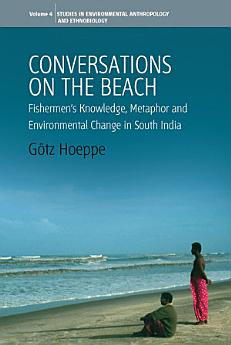Conversations on the Beach: Fishermen's Knowledge, Metaphor and Environmental Change in South India
About this ebook
Based on ethnographic fieldwork among Hindus and Muslims in a coastal village, this book explores the fisherfolk's environmental knowledge, its transformation in a period of rapid socio-economic and political change as well as its role in dealing with the state and the science - putatively universal and objective - upon which the state's policies are claimed to be based. The book emphasises conversation as a cultural process, metaphors and figurative speech in the investigation of knowledge, as well as the use and limits of memory in conceptualising environmental change.
About the author
Gotz Hoeppe is an editor of the magazine Spektrum der Wissenschaft and a part-time lecturer in social anthropology at the University of Heidelberg. He studied ethnology, physics and astronomy in Gottingen, Albuquerque and Berlin and has done fieldwork in Papua New Guinea and India. The author of Why the Sky is Blue (forthcoming at Princeton University Press), Hoeppe now investigates the epistemic practices of astronomers.







